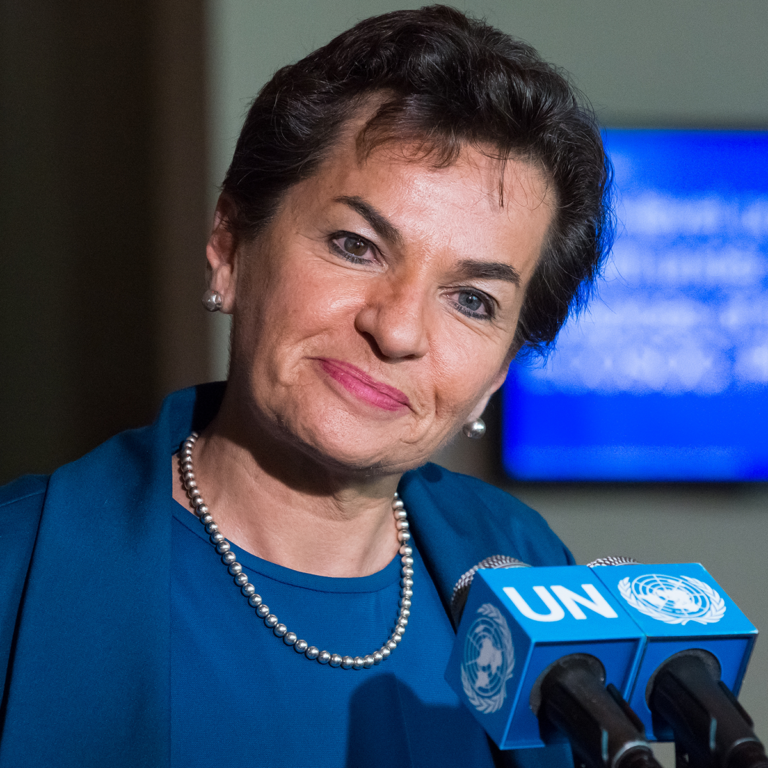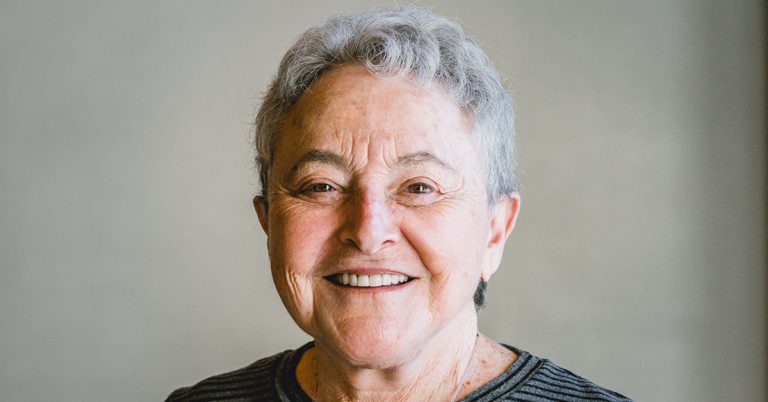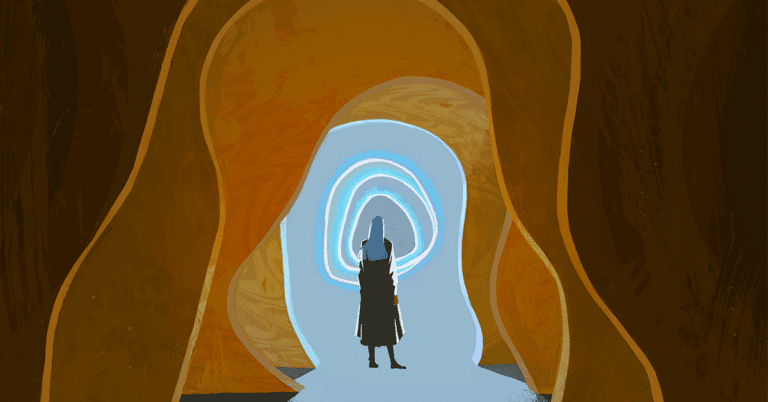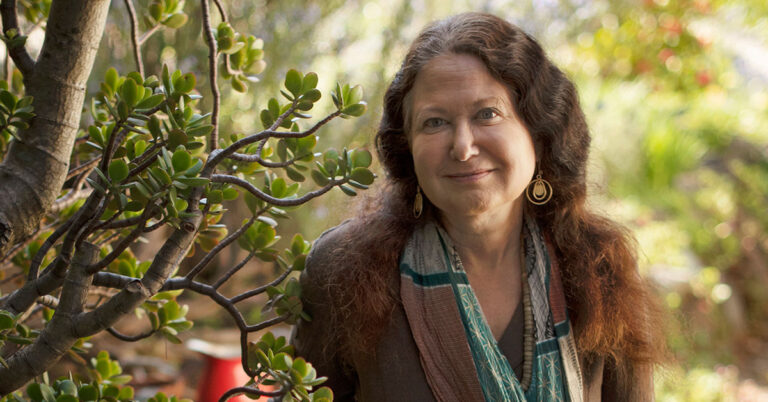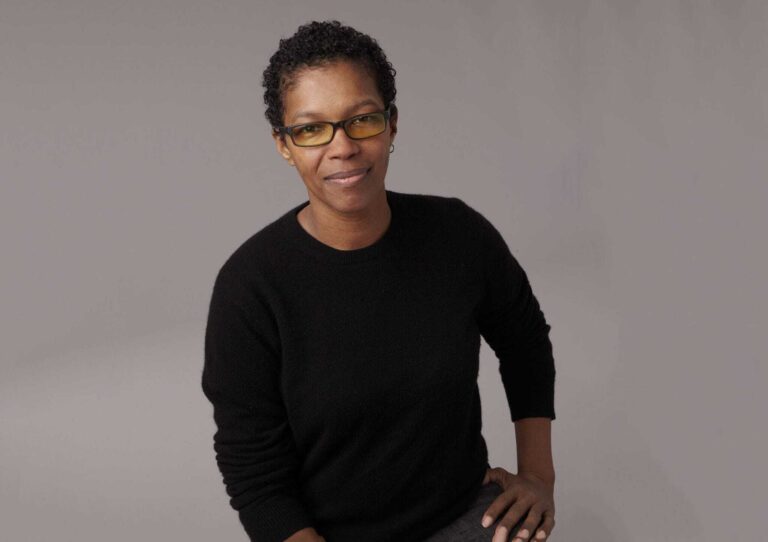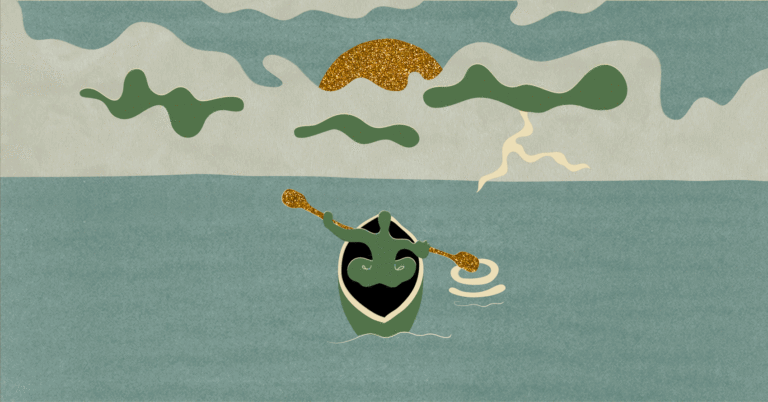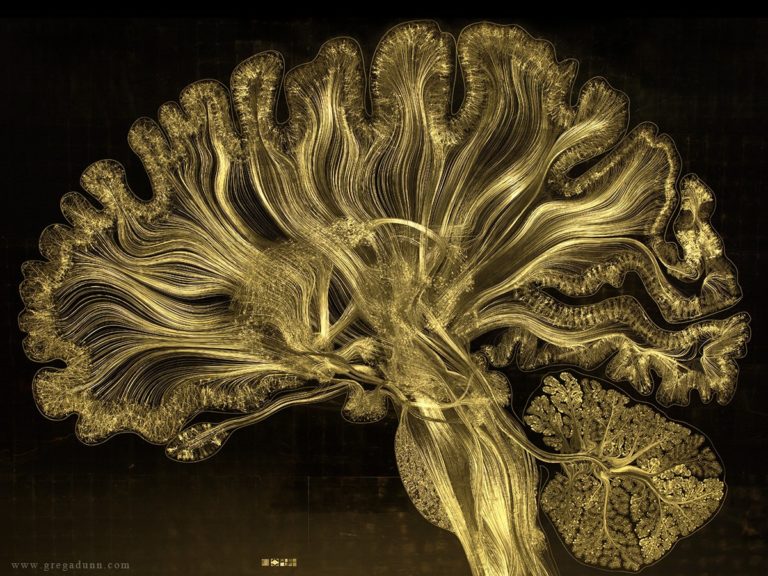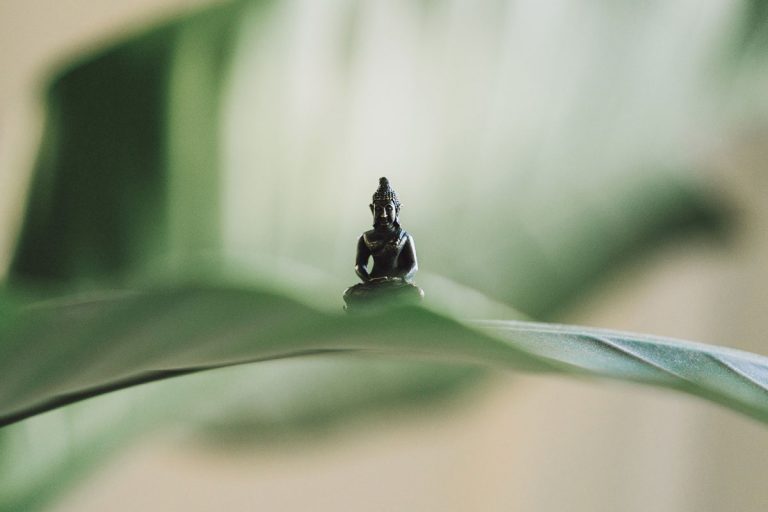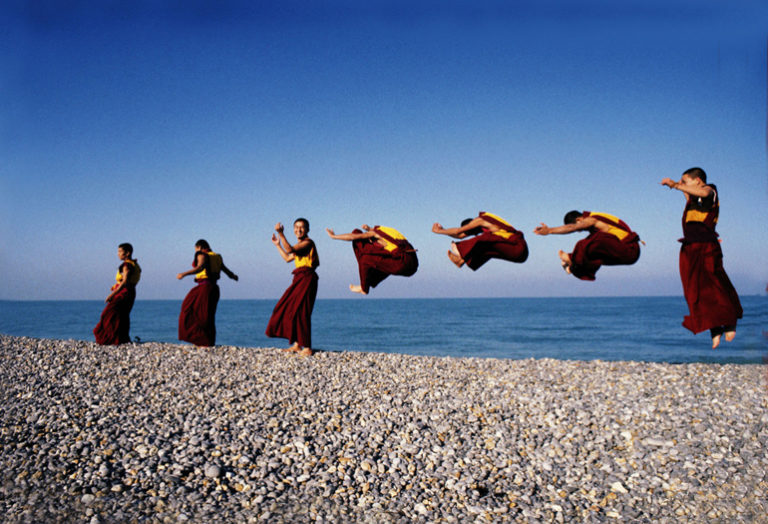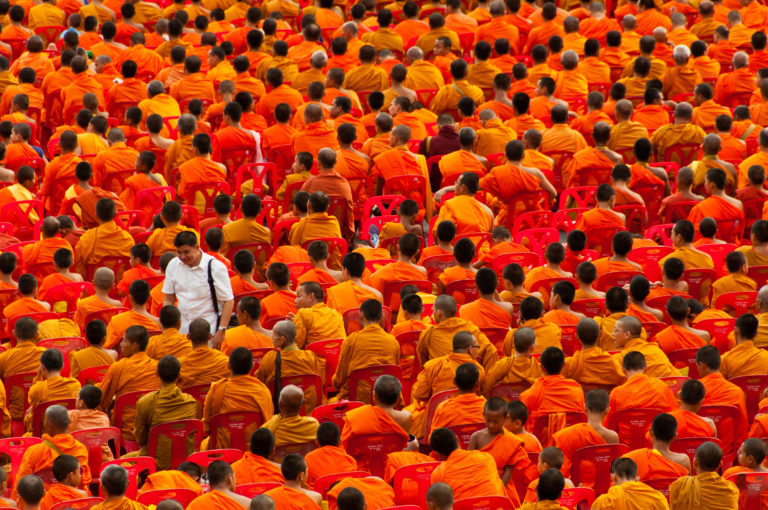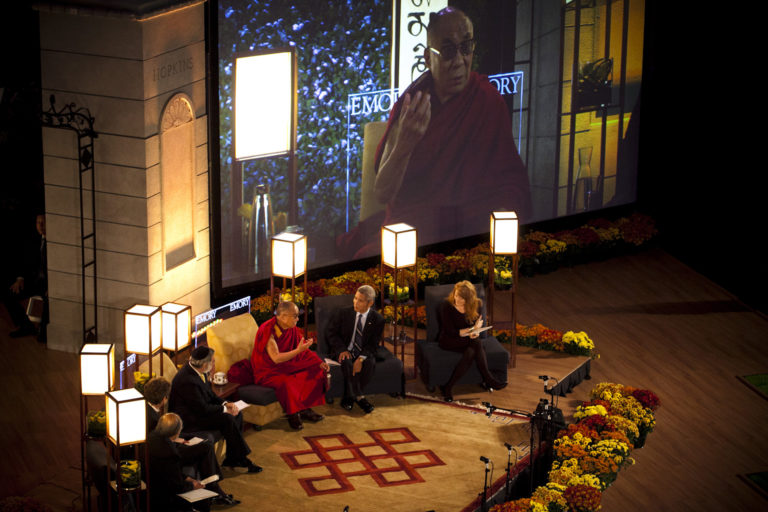A Buddhist philosopher of ecology, Joanna Macy says we are at a pivotal moment in history with the possibility to unravel or create a life-sustaining human society. Now entering her 90s, Macy has lived adventurously by any definition. She worked with the CIA in Cold War Europe and the Peace Corps in post-colonial India and was an early environmental activist. She brings a poetic and spiritual sensibility to her work that’s reflected in her translations of the early-20th-century poet Rainer Maria Rilke. We take that poetry as a lens on her wisdom on the great dramas of our time: ecological, political, personal.
Buddhism
Featured Items
September 10, 2020
angel Kyodo williams
The World Is Our Field of Practice
This prophetic conversation, which Rev. angel Kyodo williams had with Krista in 2018, is an invitation to imagine and nourish the transformative potential of this moment — toward human wholeness. Rev. angel is an esteemed Zen priest and the second Black woman recognized as a teacher in the Japanese Zen lineage. She is one of our wisest voices on social evolution and the spiritual aspect of social healing.
View
- List View
- Standard View
- Grid View
20 Results
Filters
November 9, 2023
Christiana Figueres
Ecological Hope, and Spiritual Evolution
The ecological crisis we are standing before is at once civilizational and personal — intimately close to each of us in the places we love and inhabit, and unfolding at a species level. And as much as anyone alive on the planet now, Christiana Figueres has felt the overwhelm of this and stepped into service. She gives voice so eloquently to the grief that we feel and must allow to bind us to each other — and what she sees as a spiritual evolution the natural world is calling us to.
If you have wondered how to keep hope alive amidst a thousand reasons to despair, if you are ready to take your despair as fuel — intrigued by the idea of stepping into love and immediate realities of abundance and regeneration — this conversation is for you.
A few years ago, Krista hosted an event in Detroit — a city in flux — on the theme of raising children. The conversation that resulted with the Jewish-Buddhist teacher and psychotherapist Sylvia Boorstein has been a companion to her and to many from that day forward. Here it is again as an offering for Mother’s Day — in a world still and again in flux, and where the matter of raising new human beings feels as complicated as ever before. Sylvia gifts us this teaching: that nurturing children’s inner lives can be woven into the fabric of our days — and that nurturing ourselves is also good for the children and everyone else in our lives.
February 17, 2022
Sharon Salzberg and Robert Thurman
Love Your Enemies? (Really?)
It’s a piece of deep psychological acuity, carried in many religious traditions: that each of us is defined as much by who our enemies are and how we treat them as by whom and what we love. In this episode, two legendary Buddhist teachers shine a light on the lofty ideal of loving your enemies and bring it down to earth. Across a half-century conversation and friendship, Sharon Salzberg and Robert Thurman have investigated the mind science behind this virtue and practice. They illuminate how to transmute the very real, very consequential and consuming energy of anger and hatred — and why love in fact can be a rational and pragmatic stance towards those who vex us. This is a conversation filled with laughter and friendship and with practical wisdom on how we relate to that which makes us feel embattled from without, and from within.
The esteemed writer Jane Hirshfield has been a Zen monk and a visiting artist among neuroscientists. She has said this: “It’s my nature to question, to look at the opposite side. I believe that the best writing also does this … It tells us that where there is sorrow, there will be joy; where there is joy, there will be sorrow … The acknowledgement of the fully complex scope of being is why good art thrills … Acknowledging the fullness of things,” she insists, “is our human task.” And that’s the ground Krista meanders with Jane Hirshfield in this conversation: the fullness of things — through the interplay of Zen and science, poetry and ecology — in her life and writing.
One of the great challenges of life is to learn to be alone peaceably, at home in oneself. The pandemic forced many of us inside both physically and emotionally, even if we were not home on our own. We’ve been forced to work out the difference between loneliness and solitude. With teachers across the ages, and drawing on his life from monasticism to marriage, Buddhist writer and scholar Stephen Batchelor teaches how to approach solitude as a graceful and life-giving practice.
September 10, 2020
angel Kyodo williams
The World Is Our Field of Practice
This prophetic conversation, which Rev. angel Kyodo williams had with Krista in 2018, is an invitation to imagine and nourish the transformative potential of this moment — toward human wholeness. Rev. angel is an esteemed Zen priest and the second Black woman recognized as a teacher in the Japanese Zen lineage. She is one of our wisest voices on social evolution and the spiritual aspect of social healing.
In this “spiritual book club” edition of the show, Krista and musician/artist Devendra Banhart read favorite passages and discuss When Things Fall Apart, a small book of great beauty by the Tibetan Buddhist teacher Pema Chödrön. It’s a work — like all works of spiritual genius — that speaks from the nooks and crannies and depths of a particular tradition, while conveying truths about humanity writ large. Their conversation speaks with special force to what it means to be alive and looking for meaning right now.
Brain surgeon James Doty is on the cutting edge of our knowledge of the brain and the heart: how they talk to each other; what compassion means in the body and in action; and how we can reshape our lives and perhaps our species through the scientific and human understanding we are now gaining.
Mirabai Bush works at an emerging 21st century intersection of industry, social healing, and diverse contemplative practices. Raised Catholic with Joan of Arc as her hero, she is one of the people who brought Buddhism to the West from India in the 1970s. She is called in to work with educators and judges, social activists and soldiers. She helped create Google’s popular employee program, Search Inside Yourself. Her life tells a fascinating narrative of our time: the rediscovery of contemplative practices, in many forms and from many traditions, in the secular thick of modern culture.
Stephen Batchelor’s secular Buddhism speaks to the mystery and vitality of spiritual life in every form. For him, secularism opens to doubt and questioning as a radical basis for spiritual life. Above all, he understands Buddhism without transcendent beliefs like karma or reincarnation to become something urgent to do, not to believe in.
It’s easy to despair at all the bad news and horrific pictures that come at us daily. But Roshi Joan Halifax says this is a form of empathy that works against us. There’s such a thing as pathological altruism. This zen abbot and medical anthropologist has nourishing wisdom as we face suffering in the world.
A French-born Tibetan Buddhist monk and a central figure in the Dalai Lama’s dialogue with scientists, Matthieu Ricard was dubbed “The Happiest Man in the World” after his brain was imaged. But he resists this label. In his writing and in his life, he explores happiness not as pleasurable feeling but as a way of being that gives you the resources to deal with the ups and downs of life and that encompasses many emotional states, including sadness. We take in Matthieu Ricard’s practical teachings for cultivating inner strength, joy, and direction.
September 25, 2014
His Holiness the 14th Dalai Lama of Tibet, Jonathan Sacks, Katharine Jefferts Schori, and Seyyed Hossein Nasr
Pursuing Happiness
The XIV Dalai Lama seems to many to embody happiness — happiness against the odds, a virtue that is acquired and practiced. Before a live audience in Atlanta, Georgia, Krista had a rare opportunity to mull over the meaning of happiness in contemporary life with him and three global spiritual leaders: a Muslim scholar, a chief rabbi, and a presiding bishop. An invigorating and unpredictable discussion exploring the themes of suffering, beauty, and the nature of the body.
Esoteric teachings on reincarnation and consciousness; simple teachings on compassion and ethics. Geshe Thupten Jinpa is a man who finishes the Dalai Lama’s English sentences. Meet this philosopher and former monk, now a husband and father of two daughters, and hear what happens when the ancient tradition embodied in the Dalai Lama meets science and life.
Jon Kabat-Zinn has learned, through science and experience, about mindfulness as a way of life. This is wisdom with immediate relevance to the ordinary and extreme stresses of our time — from economic peril, to parenting, to life in a digital age.
A few years ago, journalist Pankaj Mishra pursued the social relevance of the Buddha’s thought across India and Europe, Afghanistan and America. He emerged with a startling critique of Western political economy that is even more resonant today as he pursued the social relevance of the Buddha’s core questions: Do desiring and acquiring make us happy? Does large-scale political change really address human suffering?
The Pause
Join our constellation of listening and living.
The Pause is a monthly Saturday morning companion to all things On Being, with heads-up on new episodes, special offerings, event invitations, recommendations, and reflections from Krista all year round.
Search results for “”
View
- List View
- Standard View
- Grid View
Filters

